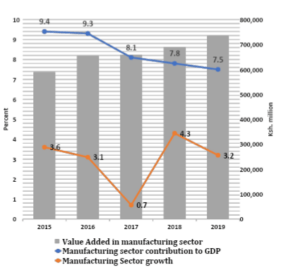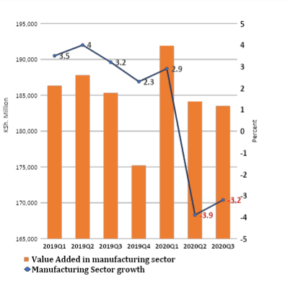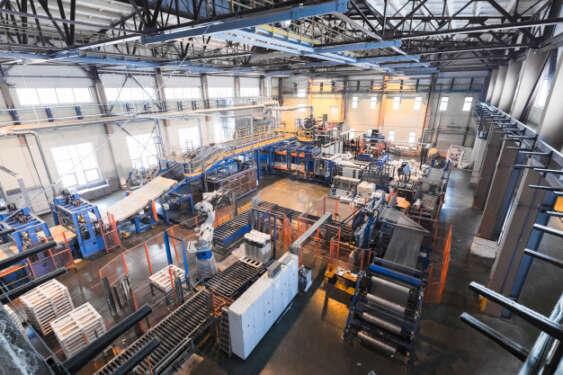The Kenya Association of Manufacturers urged the government of Kenya to urgently address the way to economic recovery following the immense effects of the pandemic.
This was said during the launch of the Kenya Association of Manufacturers (KAM) 2021 Manufacturing Priority Agenda (MPA), themed “From surviving COVID-19 to thriving: Manufacturing sector rebound for the sustained job and investment growth”.
Speaking during the Agenda launch, Mr Mucai Kunyiha, the KAM chair said that the economic recovery highly depends on the goodwill and full commitment from the government.
He explained that “Efforts to enhance our productivity are hampered by the increasing cost of doing business and low competitiveness. Some of the issues that contribute to this are regulatory overreach high cost of energy, transport, and logistics costs. To resolve these headwinds, it is paramount that the government and its agencies strongly commit and demonstrate goodwill to securing the future of our country’s economic development.”
Mr Kunyiha also said that manufacturers are also struggling with an inefficient transport and logistics system, causing unnecessary delays at the port of Mombasa besides persistent high fiscal deficit, increasing public debt and regulatory overreach.
He noted that currently, containers take more than four days to get cleared at the port while the cargo owners still get charged for storage and demurrage costs. The delay he said leads to challenges in raw material sourcing which forces companies to close some lines due to interruptions in scheduled production.

He added that the high cost of storage and demurrage fees increases the cost of doing business to which he asked the government to make intentional efforts towards ensuring efficiency at the port for seamless movement of cargo.
Ms Betty Maina, the Cabinet Secretary for Industrialization, Trade and Enterprise Development also spoke during the launch where she expressed the government’s commitment to streamline its operations so as to create a conducive business environment in the country.
“Previously, the need for approval from different offices increased the cost of doing business and provided opportunities for rent-seeking. The one-stop-shop for service delivery for businesses seeks to resolve this and shorten the time taken to adhere to regulations. We have also held engagements with county governments to harmonize county cess, fees and charges to reduce the cost of doing business amongst counties,” said Ms Maina.
She also appreciated the cordial relationship between the government and private sector, saying, “We continue to enhance our collaboration, to reach the grass root levels, and to promote ethical business practices for our country’s economic growth.”
Manufacturing Priority Agenda (MPA) is an annual publication that guides the Association’s advocacy efforts with Government and its agencies. The 2021 MPA is guided by five pillars to support the recovery of the manufacturing sector from the diverse effect of the pandemic.
The pillars include enhancing competitiveness and level playing field for local manufacturers, enhancing market access for locally manufactured goods both in local and export markets, promoting pro-industry policy and institutional framework, promoting SME Development and enhancing industrial sustainability and resilience.
According to the MPA, the impact of the COVID-19 pandemic in Kenya was heavily felt in the second quarter of 2020 as the country instituted measures aimed at containing the spread of the virus.
Where the output by the manufacturing sector contracted by 3.2 per cent in 2020 Q3 and 3.9 per cent in 2020 Q2 compared to a growth of 2.9 per cent in 2020 Q1.

The value added by the sector dropped to KSh.183 billion in 2020 Q3 from KSh.191 billion in 2020 Q1.
Kenya Association of Manufacturers is a business member organization which represents value add companies and associates services in Kenya. The estimated significant contribution of its members’ is around a quarter of the country’s Gross Domestic Product.
The association promotes trade and investment, upholds standards, encourages the formulation, enactment and administration of sound policies that facilitate a competitive business environment and reduce the cost of doing business.
Also Read: Kenya’s manufacturing sector gears up for the reopening of the economy











